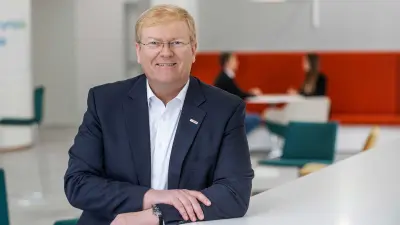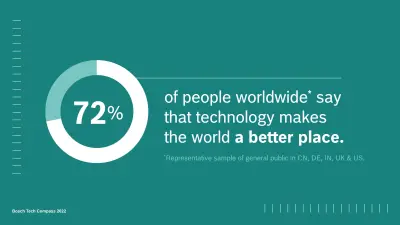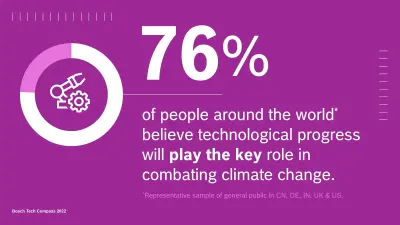风萧萧_Frank
以文会友技术是关键
https://www.bosch.com/stories/hartung-interview-technology-is-the-key/
对于博世董事长斯特凡·哈同博士来说,技术是应对气候变化的关键
罗伯特·博世有限公司管理委员会主席 Stefan Hartung 博士的肖像。
自一月份以来,您一直负责德国最大的公司之一。 责任对你个人意味着什么?
对我来说,责任首先涉及的是对我的行为负责的义务。 但除此之外,以我作为博世管理委员会主席的身份,这意味着确保采取一切必要措施来帮助我们实现目标。 我们公司创始人罗伯特·博世给我们留下了明确的指导,告诉我们这些目标是什么:维护我们的独立性,确保公司强劲而有意义的发展,并利用博世技术改善人们的生活。
拥有工程学博士学位,你可能会以与律师或经济学家不同的方式看待很多事情。 当领导像博世这样的公司时,这种技术视角有用吗?
最重要的是,我成为一名工程师的原因是因为我对技术和创造技术的人着迷,而不是因为我决定有一天要经营一家公司。 但我在这里经营一家公司。 这让我有机会将我对技术的热情运用到高科技公司的重要领域。 通过这种方式,我可以查明和评估技术趋势和潜力,并与我的管理团队一起决定公司是否进入新业务。 在这种情况下,接受过工程师培训肯定会有所帮助。
全球 72% 的人*表示技术让世界变得更美好。 *中国、德国、印度、英国和美国公众的代表性样本。
技术如何帮助德国实现巴黎气候目标?
只有借助创新技术,我们才能实现巴黎气候目标。 我并不是唯一一个这样看待事情的人。 在我们的“科技指南针”调查中,全球四分之三的受访者表示,技术是应对气候变化的关键。 更重要的是,我绝对确信我们还没有发明出迈向净零排放所需的所有技术解决方案。 还有更多的事情需要发生——作为一个乐观主义者,我相信还会有更多的事情发生。
我观察到社会责任如何成为当今许多公司的固定组成部分。
Stefan Hartung,罗伯特·博世有限公司管理委员会主席
博世以其社会承诺而闻名。 这种承诺是家族企业的典型特征吗?
嗯,在德国经济中——过去和现在——确实有很多有责任心的家族企业的例子。 对于罗伯特·博世来说,社会正义和社会凝聚力是重要的关注点。 作为一家公司,我们通过罗伯特·博世基金会,本着他的精神继续这一承诺。 但我观察到社会责任如何成为当今许多公司的固定组成部分——无论它们的法律结构和组织方式如何。
博世内部正在采取哪些措施来应对当今时代的挑战?
我们这个时代最大的挑战是气候变化。 它让我们没有犹豫或拖延的余地。 博世在这方面发挥着主导作用。 自 2020 年 2 月以来,这表明跨国企业的制造业务可以在全球范围内实现碳中和。 我们正在将我们的经验传递给其他想要追随我们脚步的公司。 与此同时,我们的产品也有助于实现更可持续的生活方式。
您的公司宣称是“为生活而发明”,并且您的产品可以在其他公司生产的许多其他产品中找到。 这是否意味着特殊的责任? 毕竟,在可持续发展方面,您可以施加的影响力是巨大的。
可持续发展是每个人和每个机构的责任。 只有当我们将其视为全世界整个社会的一项任务时,我们才有机会。 我们意识到我们在博世所承担的责任——也是其他人的先驱和榜样。 我们在这里兑现我们的承诺。
接受新的和未知的事物,接受它们,并积极地不断学习,这一点至关重要。
Stefan Hartung,罗伯特·博世有限公司管理委员会主席
员工将面临哪些新挑战?博世可以帮助他们吗?
最重要的是,他们必须对变革保持开放态度。 我们生活的世界是复杂且不断变化的。 一次又一次,这迫使我们作为一家公司适应新业务领域的出现、旧业务领域的彻底变化以及其他业务领域的完全半途而废。 因此,对于我们的员工来说,至关重要的是,他们愿意接受新的和未知的事物,接受它们,并积极不断地学习。 几年前,我们宣布博世是一个学习型组织,本着这种精神,我们提供了各种
终身学习的计划和政策。 我们言出必行:在过去的五年里,我们投资了 10 亿欧元来重新培训和进一步培训我们的员工。
汽车行业是您最重要的行业之一。 博世可以采取哪些措施来使未来的出行更加可持续?
博世可以做的事情之一就是保持真正的技术中立。 我们为每种应用提供正确的解决方案。 例如,在我们的动力总成部门,这意味着我们不仅大力投资电动汽车,而且还在改进和磨练经典内燃机的组件。 未来几十年仍然需要这些技术,为了缓解全球变暖和保护环境,它们必须反复升级到最先进的水平。
罗伯特·博世有限公司管理委员会主席 Stefan Hartung 博士接受采访。
鉴于气候中和的重要性,您认为电动动力总成是汽车行业未来的正确解决方案吗?
嗯,是的,也不是。 这总是取决于具体情况。 在欧洲,如果我们设法加快基础设施的建设,包括充电站和加氢站,并提供绿色电力和氢气,那么这里选择的动力系统显然将是电动的,包括电池和燃料电池 。 在非洲、南美洲和亚洲部分地区,情况则截然不同,而且这种情况将持续多年。 在许多情况下,这些地区根本不具备电动汽车所需的基础设施。 因此,我们将继续需要这些地区的内燃机——使用碳中性燃料的高效发动机。 此外,此类燃料还可用于现有机队,并使空运和海运实现气候中性。
如何以气候中和的方式提供这么多电动汽车所需的能源?
不仅汽车需要能源,工业和私人家庭也需要能源。 所有这些都必须提供气候中性的能源。 未来,这只能通过进口能源来实现。 我们将进口绿色氢,而不是石油和天然气等化石燃料。 好消息是,世界上有些地区日照时间长,为生产绿色氢提供了理想的条件。 我们现有的天然气管网是分配天然气的理想选择。 也就是说,我们现在必须做很多事情来建立供应链。
76% 的受访者*认为技术进步将在应对气候变化方面发挥关键作用。 *中国、德国、印度、英国和美国公众的代表性样本。
博世目前正在开展哪些技术创新(可能是开创性的创新)?
一项创新是否具有开创性,一般只能在事后回顾时才能正确判断。 但无论如何,博世的创新清单很长。 我们的电子防滑系统 ESP 迄今已挽救了约 15,000 条生命,博世制造微机电传感器的工艺,以及我们在大流行开始时仅用六周时间开发的冠状病毒快速 PCR 测试。 这些只是几个例子。 每年,我们在研发上花费数十亿欧元。 如果我看看我们在软件和人工智能方面取得的进展,那么我可以向你保证这个列表将会变得更长。
这篇采访的德文版首次发表在 Magazin des F.A.Z.-Instituts 上。
Technology is the key
https://www.bosch.com/stories/hartung-interview-technology-is-the-key/
For the Bosch chairman Dr. Stefan Hartung, technology is the key to combating climate change

Since January, you've been in charge of one of Germany’s biggest companies. What does responsibility mean for you personally?
For me, the first thing responsibility involves is the obligation to answer for my actions. But beyond that, in my capacity as chairman of the Bosch board of management, it means ensuring that everything necessary is done to help us achieve our objectives. Our company founder Robert Bosch left us with clear guidance as to what those objectives are: safeguarding our independence, ensuring the company’s strong and meaningful development, and using Bosch technology to improve people’s lives.
With a doctorate in engineering, you perhaps see a lot of things differently from a lawyer or an economist. Is such a technological perspective useful when leading a company like Bosch?
More than anything else, the reason I became an engineer was because I’m fascinated by technology and the people who create it, and not because I decided I wanted to run a company one day. But here I am, running a company. And that gives me the chance to apply my enthusiasm for technology where it matters, in a high-tech company. In this way, I can pinpoint and evaluate technological trends and potential, and decide together with my board of management team whether the company will enter a new business or not. And in such cases, it certainly helps to have trained as an engineer.

How can technology help Germany achieve the Paris climate targets?
It’s only with the help of innovative technology that we will achieve the Paris climate targets. And I’m not the only person to see things that way. Three out of four of the people we polled worldwide in our Tech Compass survey said that technology is the key to combating climate change. What’s more, I’m absolutely sure that we have by no means invented all the technological solutions we will need as we move toward net zero. A lot more needs to come — and as an optimist, I’m sure a lot more will come.
I’ve observed how social responsibility has become a fixture of many of today’s companies.
Stefan Hartung, chairman of the board of management, Robert Bosch GmbH
What is Bosch doing in-house to tackle the challenges of our age?
The greatest challenge of our age is climate change. It leaves us no room for hesitancy or procrastination. Bosch is playing a leading role here. Since February 2020, it has shown that a multinational enterprise’s manufacturing operations can be carbon neutral — worldwide. We are passing on our experience to other companies that want to follow in our footsteps. At the same time, our products are also helping enable a more sustainable way of life.
Your corporate claim is “Invented for life,” and your products can be found in many other products made by other companies. Does that mean a special responsibility? After all, when it comes to sustainability, the amount of leverage you can apply is enormous.
Sustainability is the responsibility of every single person and institution. And only if we see it as a task for the whole of society, worldwide, will we have any kind of chance. We are aware of the responsibility we bear at Bosch – also as a pioneer and role model for others. We are honoring our commitment here.
It’s crucially important to accept things that are new and unknown, take them on board, and actively keep learning.
Stefan Hartung, chairman of the board of management, Robert Bosch GmbH
Above all, they will have to remain open for change. The world we live in is complex and in flux. Again and again, this forces us as a company to adapt as new areas of business come into being, old ones change radically, and others fall by the wayside completely. So for our associates, it’s crucially important that they be willing to accept things that are new and unknown, take them on board, and actively keep learning. Some years ago, we declared Bosch a learning organization, and in this spirit we offer a variety of programs and policies for lifelong learning. And we put our money where our mouth is: over the past five years, we have invested a billion euros in reskilling and further training our workforce.
The automotive industry is one of the most important sectors for you. What can Bosch do there to make future mobility more sustainable?
One of things Bosch can do is to remain truly technology neutral. We have the right solution for every application. In our powertrain division, for example, this means we aren’t just investing heavily in electromobility, we’re also refining and honing our components for classic combustion engines. These will still be needed for many decades to come, and to mitigate global warming and protect the environment they will repeatedly have to be brought up to the state of the art.

Given the primacy of climate neutrality, do you think the electrical powertrain is the right solution for the future of the automotive industry?
Well, yes and no. It always depends on circumstances. Here in Europe, if we manage to speed up the build-out of infrastructure, with charge spots and hydrogen filling stations, and to make green electricity and hydrogen available, then the powertrain of choice here will obviously be electrical, with batteries and fuel cells. In Africa, South America, and parts of Asia, the situation is a quite different one, and will remain so for years. In many cases, these regions simply do not have the infrastructure needed for electromobility. So we will continue to need combustion engines for these regions — highly efficient engines that run on carbon-neutral fuels. Moreover, such fuels can also be used in the existing fleet, and make air and sea transport climate neutral.
How can the energy needed for so many electric cars be made available in a climate-neutral way?
It’s not just vehicles that need energy, but industry and private households as well. All of them have to be supplied with climate-neutral energy. In the future, that will only work by importing energy. Instead of fossil fuels like oil and gas, we will import green hydrogen. The good thing is that there are regions in the world whose long hours of sunshine give them ideal conditions for producing green hydrogen. And the gas grids we already have are ideal for distributing it. That said, we now have to do a lot to set up supply chains.

What technical innovations — possibly pioneering ones — is Bosch working on at the moment?
Whether or not an innovation is pioneering can generally only be judged properly in retrospect. But whatever the case, the list of Bosch innovations is long. There’s our electronic anti-skid system ESP which has saved some 15,000 lives so far, the Bosch process for manufacturing microelectromechanical sensors, and the rapid PCR test for coronavirus that we developed in just six weeks at the start of the pandemic. And those are just a few examples. Every year, we spend several billion euros on research and development. And if I look at the progress we’re making in software and artificial intelligence, then I can promise you that the list is about to get a lot longer.
This interview was first published in German in Magazin des F.A.Z.-Instituts.




